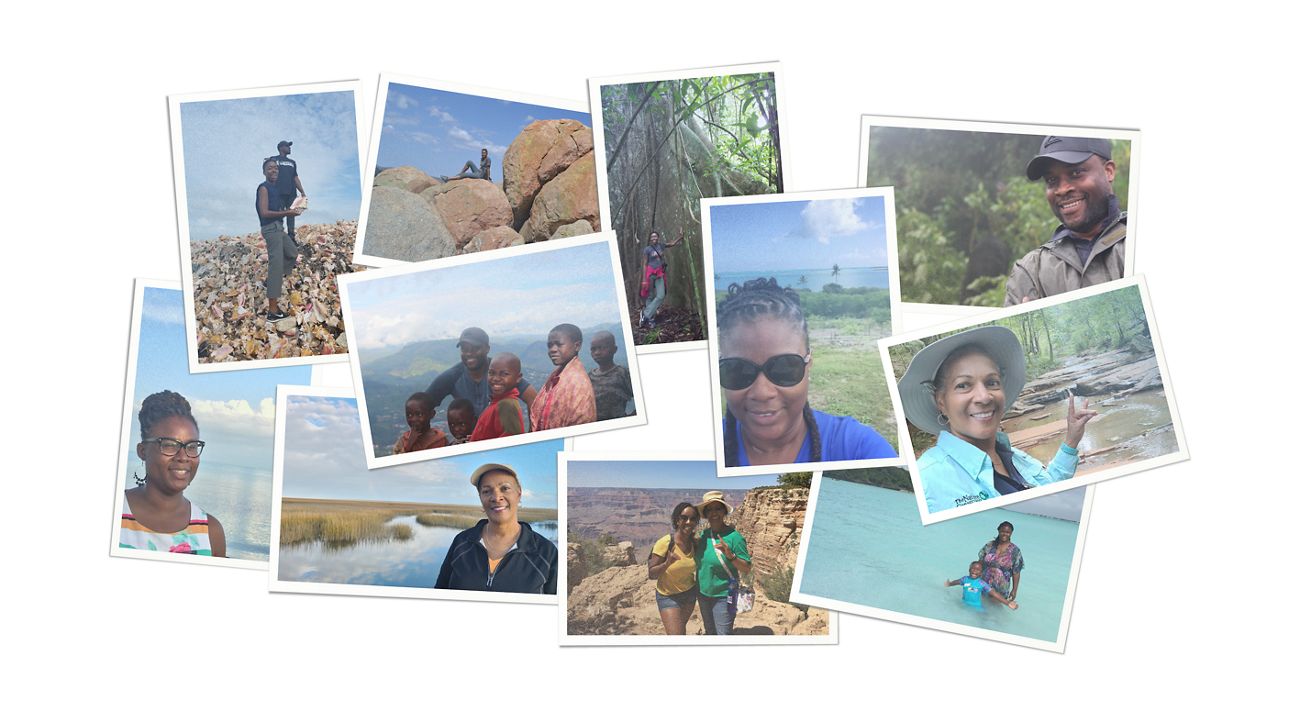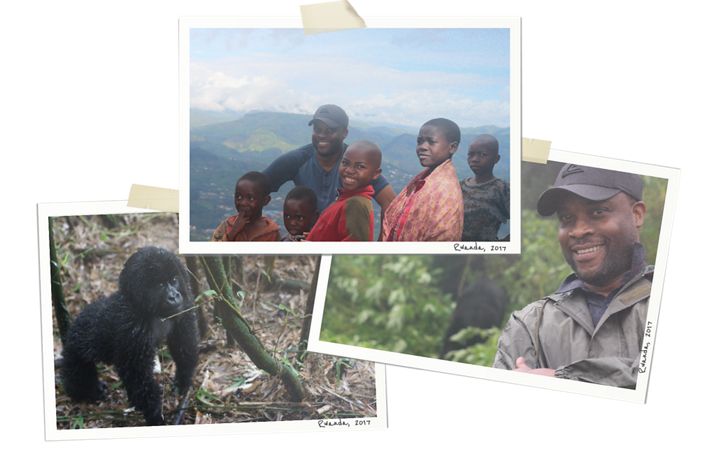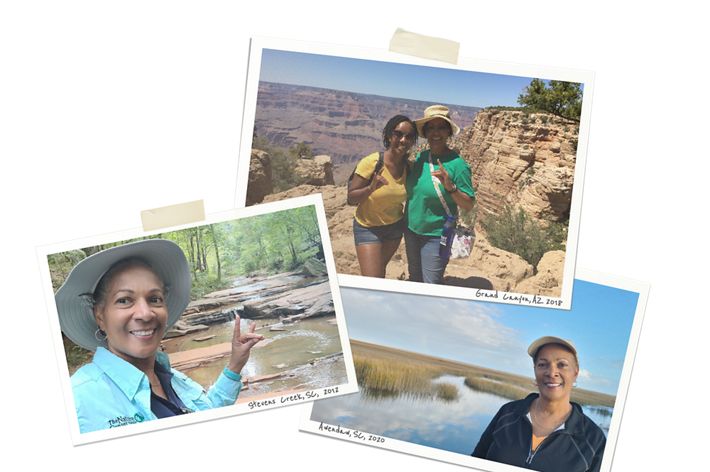A single soprano might dazzle an audience with a high-fluted aria, but no individual voice can replicate the soul-stirring warmth and complexity of the layered tones in a choir. When a diversity of voices come together, hitting different notes in harmony, that’s where the real magic happens.
The Nature Conservancy recognizes that we have a role to play – and more to do – in learning from, representing, and amplifying all the many voices in Nature’s choir. So, in these (still) unprecedented times we virtually sat down with four of our Black colleagues at TNC to talk about their journeys in conservation and how we can all reflect, reconnect, and recognize ourselves in nature.
Bola Olusanya, Chief Investment Officer, Virginia
Dale Threatt-Taylor, State Director, South Carolina
Jessica Muzengezi, Senior Advisor for Livelihoods, Florida
Shenique Albury-Smith, Northern Caribbean Director, The Bahamas
We thank Bola, Dale, Jessica, and Shenique, for sharing their words and images with us. This is the beginning of our renewed efforts to better showcase the many diverse voices in our choir – the overture, if you will.
Quote: Bola Olusanya
I feel like I’m a black swan – the rare black man at the intersection of two white-dominated fields of investments and conservation – but, I hope that I won’t be one for too long.
REFLECTING on Formative Experiences
I grew up in Lagos, Nigeria – a super-urban, highly dense metropolis. Not surprisingly, thoughts about enjoying green space or conserving nature were alien to me. At the age of ten however, I convinced my dad to enroll me in a boarding house right smack in the middle of nowhere (boarding schools in Nigeria, unlike here in the States, are not for the elite). During my time there, each student had a farm, a plot of land to tend to, and we produced every food we ate: Rice, yam, corn, beans, cassava, palm oil, you name it. Each year we would spend three days in the wild with nothing but a few gallons of water. We called it “Education for Self-Reliance.” It was an endurance test to see if we could re-create the lives of our stone age ancestors and survive. It was beautiful, an unadulterated exposure to nature.
-Bola
As a child I would spend the summers with my grandmother on the island of Abaco, which was quite rural compared to my life in the capital city of the Bahamas on the island of New Providence. I remember loving the freedom of the small island life. I had so many great nature experiences in Abaco that I could not in the city; things like going seagraping, fishing from the rocks, and collecting curbs (chitons) and whelks (small sea snails) to make fresh seafood salad.
-Shenique
Conservation always seemed so removed from my reality, it was ‘giant trees being cut down in a rainforest’ or ‘a polar bear in the melting snow’ – all things I could scarcely imagine, coming from a landlocked southern African county. Then, I took an internship with an environmental organization helping communities gain livelihoods from wildlife. I was surprised at the income these communities got from wildlife, there was not a farm crop that could provide anything near that in these dry, remote areas. At that moment I knew that development and conservation are not mutually exclusive- here was a solution transforming lives and landscapes. I was hooked!
-Jessica
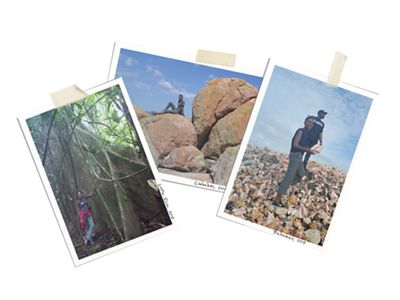
Quote: Jessica Muzengezi
Being Black and working in conservation means that the solutions we work towards must work for nature AND people.
RECOGNIZING Race
To me, being Black and working in conservation means that the solutions we work towards must work for nature and people, it simply cannot be one or the other. It means recognizing the many ways in which people connect to nature, appreciate it. It means always seeking understanding and meeting people where they are. The challenges we face are immense and everyone has a role to play.
-Jessica
Any individual can be connected to nature. But, in my career, I was always aware that my spending time in nature came with extra dangers which my peers did not experience. I learned to adhere to all the unspoken rules that were ever-present while working in conservation in the southern United States, like: ‘Don’t go to the field alone unless you know exactly where you are going.’ and ‘Learn to ignore the confederate flag you may pass on the way to install a conservation practice or talk with a local farmer.’ I also came to expect to be the “only one” in a training, meeting, board room, and everywhere else, which is its own kind of burden. That being said, my peers in conservation were the most welcoming, environmentally passionate and all-around wonderful folks anyone would love to call their “work family”.
-Dale
I feel like I’m a black swan – the rare black man at the intersection of two white-dominated fields of investments and conservation – but, I hope that I won’t be one for too long. For decades, medieval Europe believed all swans were invariably white, until black swans were first sighted in Western Australia. In investments, black swans are those rare, highly improbable events, with highly impactful consequences. The 2008/2009 global financial crisis, for example, is often cited as a black swan event because very few people saw it coming and the economic devastation was felt by many. Being a black man in conservation may not be as rare as those black swans, but the analogy feels apt. There are just too few of us, and it’s a shame. The climate crisis will undoubtedly impact more Blacks, so it is imperative for more of us (if not all of us) to be a part of today’s conservation movement. Yes, people of color have legitimate reasons to question the methods and practices of early conservationists, but the existential threat we face together is bigger than the sins of the past. Apathy is not an option.
-Bola
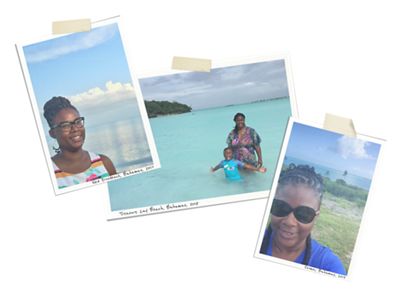
Quote: Shenique Albury-Smith
The same water that brings peace can also bring anxiety, and so many other feelings. This is reflective of so much of life which can bring both joy and pain, often at the same time.
RECONNECTING to Something Bigger
Nature has an inherent peacefulness that I don’t feel anywhere else and somehow this peace is imparted to me. However, I also love the contrast that can be found in nature. Being from an island nation that sits in the hurricane belt, I have experienced the calm seas and the raging waters of our oceans. The same water that brings peace can also bring anxiety, and so many other feelings. This is reflective of so much of life which can bring both joy and pain, often at the same time.
-Shenique
I love going on long walks with friends and family, taking in all the plants and creatures, and finishing up the day with a shared meal around an open fire sharing stories and laughter. There is something special about spending time with family and friends out in the open, in nature. There is that sense of connection to each other and to something greater; a reminder that we are part of a community, and part of this immense system that is Earth.
-Jessica
As a soil conservationist at heart, visiting the Grand Canyon was an emotional experience for me! Imagine pondering the erosion that took place to carve the canyon... The history that Nature tells in the sedimentary layers made me dream of time travel. No matter how much we study, we will never know the entire story of time and life on this planet.
-Dale
Quote: Dale Threatt-Taylor
Any individual can be connected to nature. But, in my career, I was always aware that my spending time in nature came with extra dangers, which my peers did not experience.
